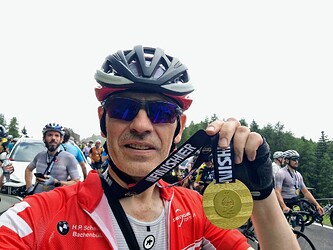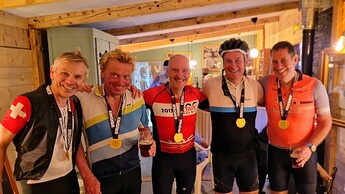First, BUMMER @Neil_Maitland! I hear your pain. I suffered a pilon fx of the right ankle in 2013. Two separate surgeons told me that my impact sports days were over. Thankfully, I got the one who did the surgery onboard with believing in excellence. Since then I’ve done 18 Ironmans and two Ultramans.
Second, believing in possibility is HUGE. Kudos to you for your stoke.
Third, IT TAKES TIME. Here’s the good and bad news. Pelvic fx’s are tricky, and each pelvic fx is different from the next. It depends where they are and if there was displacement. Also, the pelvis is a central point of load and there’s a lot that goes on in that area. In short, this is nothing to take lightly. Ok, so that’s the bad news. The good news is that it’s not an extremity that has to deal with stresses on it’s own. What I find interesting is that you were only told to keep weight off your right leg. Supposedly you landed on your right side. This tells me that your body has already started to compensate. (It literally starts happening within 48 hours.) This takes me to point 4.
Four, the body is amazing in how well it compensates. However, it’s frustrating that the body does compensate so well. What I mean is that we can compensate so well that we don’t even know we’re doing it. It’s absolutely essential that you work with a professional to a) remove the trauma of this injury from your body; b) ensure that you don’t carry compensations into the future. Everything that happens in the body leaves a trace, whether that be structural lesions or emotional/neurological scaring. If this energy isn’t taken care of it’ll cause problems down the road. Seeing a (really frigging good, wholistic) physio for a short period time only covers the physical aspect of proper movements (ROM and strength). You also have to work through the emotions and thoughts.
Five, how long will it take? To a large extent, this is dependant upon the type and severity of the fracture and any soft tissue damage. To only be on crutches for six weeks implies a pretty tame pelvic fx. Still, bone rematrixes for 18 months after a fracture. How well your pelvis mends is one limiter. Other limiters include range of motion and strength. As long as you don’t have any neurological impingements from any of this, the soft tissue side of things may be your biggest limiters.
Six, I HIGHLY recommend cross-training, both weight bearing and non-weight bearing. This will help keep the body moving and help you maintain fitness, which accelerates training.
Seven, with all the normal waivers of who and what I am not, take it slow and let pain be your guide. Your ride has quite a bit of elevation for the given distance. That’s going to need strength which is going to stress your pelvis, as well as everything upstream and downstream. Be sure you have appropriate gearing so that you can spin. That’s how I’d tackle it. Spinning works the heart more than the legs, spin your ass up those hills. Of course, if you were doing 100-120 rpm the whole way that would cause your hips and pelvis to creak and groan, so use judgement.
Lastly, what’s your age? The younger you are the more I’d suggest not fooling around and making things worse in the long run. The older you are the more I’d suggest not fooling around and potentially limiting the rest of your days to kick some butt. 

